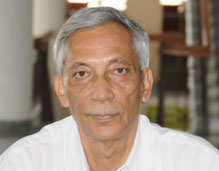You are here

| Archive data: Person was Consultant at IDSA |
A veteran of 1971 Indo-Pakistan War in Bangladesh and Operation Meghdoot (Siachen glacier) and a MSc in Defence Studies and Instructor- in- Gunnery. Last served in Faculty of Studies at the School of Artillery, Devlali. Post premature retirement in 2000, he has engaged in research and on giving lectures and presentation on his research themes. He was a Research Fellow at the IDSA from August 2005 till April 2018. With effect from September 2018 he is a Consultant for the Indigenous Historical Knowledge (IHK) Project at https://idsa.in/history. Has an abiding interest in Non Traditional Security(NTS) including environmental security, water and climate change, military affairs, and Tibet. He was convener of the IDSA working group Security Implications of Climate Change for India (2009) and a member of IDSA Task Force Report: Water Security for India(2010). He is the lead author of IDSA Task Force Report Tibet and India’s Security (2012).
Some select published books are: Environmental Security: Internal and External Dimensions and Response ,New Delhi, Knowledge World, 2003 ; National Security; A Primer , New Delhi, Knowledge World, 2004 ; Operation Bangladesh, New Delhi, Manas, 2007; Composition and Regimental System of the Indian Army: Continuity and Change, New Delhi, IDSA/Shipra, 2008; Environmental Security: New Challenges and Role of Military, New Delhi, IDSA/Shipra, 2010.
From 2012/13 he has steered the IDSA project ‘Indigenous Historical Knowledge’ and has a number of articles, three monographs ,and five chapters on or related to Kautilya’s Arthaśāstra in four edited volumes of which he is also the co-editor of the trilogy Indigenous Historical Knowledge; Kautilya and His Vocabulary, Volumes I, II and III (20015/2016). His present research interest is Kamandaka’s Nitishastra and the Kural .

Kautilya’s Arthashastra and Chanakya Niti
Traditionally, Kautilya or Vishnugupta, is considered the author of Arthashastra. He is also known as Chanakya, the scholar and chief minister who ‘destroyed the power of the Nandas and placed Chandragupta Maurya on the throne of Magadha’ in the 4th century bc. By the name of Chanakya, he had also authored a text known as Chanakya Niti. However, there is no proper understanding in the general public about the seminal work authored by Kautilya such as the Arthashastra and Chanakya Niti.
A Comparison of Kamandaka's Nitisara and Kautilya's Arthashastra: Statecraft, Diplomacy and Warfare
Kamandaka’s Nitisara was composed after the classic and the only surviving root text of Kautilya’s Arthashastra. Both the texts are important milestones in Indic heritage and tradition of political science. They share many fundamental and enduring similarities in concepts and vocabulary. There are also dissimilarities and some unique features such as Kamandaka’s strategy of Upeksha (neglect, diplomatic indifference) reused and revived during the Indian freedom struggle.
A Study of the Kural: Concepts and Themes
India has a live, longstanding, and multiple traditions of secular texts and treatise on statecraft, not only in Sanskrit but also in Dravidian traditions in Tamil. For a total picture of Indian civilization and culture there is need to explore texts other than just Sanskrit. In this category there is a powerful and compact text in Tamil from south India called the Tirukkural by Tiruvalluvar, also known as the Kural.
Science and India
Consultant to Indigenous Historical Knowledge Project at IDSA, Colonel P. K. Gautam’s article titled ‘Science and India’ has been published in Liberal Studies, Vol.3, Issue 2, July-December, 2018.
Read Complete Article [+]
Broadening the Education for Synergetic Civil–Military Relations
Statecraft, diplomacy and warfare are not only a matter of brute force, but also a function of scholarship to understand the past, present and future of the art, science and literature of national and international security. At higher levels in their professional career, besides the armed forces, a number of civil servants too have to deal with the state’s use or threat of the use of legitimate force. This article suggests broadening the education for synergetic civil–military relations (CMR).
Military-Ecological Interface
Consultant to Indigenous Historical Knowledge Project at IDSA, Col PK Gautam’s article ‘Military-Ecology Interface’ has been published in the Journal of the United Service Institution of India (USI), Vol. CXLIX, No. 615, January-March 2019.
Thucydides: Quoting and Misquoting
The Peloponnesian war was fought from 431 to 401 BC between the Peloponnesian League led by Sparta and the Athenian Empire, known as the Delian League led by Pericles, the ruler of Athens. In the initial phase of the war, Thucydides (460–395 BC) was removed from command by the Athenian government after he failed as the commanding general to prevent a Spartan occupation of Amphipolis. He was exiled for 20 years. This came as a blessing in disguise for the scholar in him. The exiled general now had the scholarly atmosphere of solitude to write his book as the war was fought.
The Nitisara by Kamandaka: Continuity and Change from Kautilya’s Arthashastra
This study compares Indian traditions of statecraft in Kamandaka’s Nitisara, or the Elements of Polity, with the earlier foundational root text of Kautilya’s Arthashastra. There are commonalities, dissimilarities and uniqueness in the texts. However, key values and concepts across time do not seem to have changed and remain relevant even today.
Leadership and Management Theories in Indic Traditions
This article aims to rediscover some key aspects of leadership and management latent in ancient Indian secular texts of statecraft and governance that are relevant in contemporary times.
‘Dharma: The Moral Aspect of Statecraft’ Published in UNISCI Journal
Consultant to Indigenous Historical Knowledge Project at IDSA, Col PK Gautam’s article, titled ‘Dharma: The Moral Aspect of Statecraft’ was published in UNISCI Journal, No.49, January 2019, University of Madrid, Special Issue on Contemporary India: Foreign and Security Policy.
Read Complete Article [+]